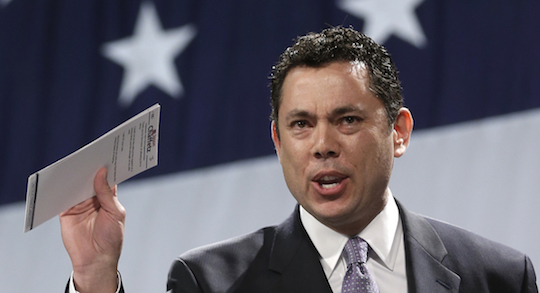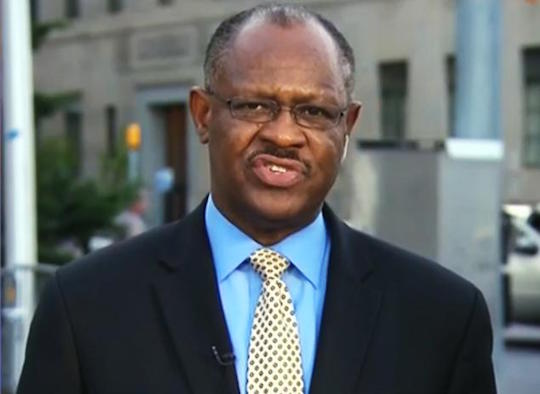If you want your name to live forever in politics, come up with a reason why helping rich people is good for everybody. That’s what Arthur Laffer did in 1974, when he drew his famous curve on a napkin. The Laffer Curve illustrates the theory that lowering tax rates can sometimes increase overall tax revenues by stimulating economic growth. This argument makes sense, as far as it goes, but it doesn’t tell us much. To many people, though, the Laffer Curve means that cutting taxes raises revenue. That’s the argument Treasury Secretary Paul Mnuchin made this week to justify President Trump’s plan to dramatically reduce corporate taxes. Won’t lowering taxes add to the deficit? Nah. “The tax plan will pay for itself with economic growth,” Mnuchin said. Well then. That sounds fortuitous.
Category Archives: Politics versus Government
iPhone remark suggests Chaffetz has no idea what insurance costs
Congressional Republicans have released their plan to replace the Affordable Care Act, and it is less than comprehensive. Andy Slavitt, former Acting Adminstrator for the Center for Medicare and Medicaid services under President Obama, described the plan as “basically a $600 billion tax cut funded by gutting Medicaid.” Although its architects claim it will preserve access for the millions of previously uninsured Americans who found coverage under Obamacare, it does away with the subsidies that let them buy it. When it was pointed out to Rep. Jason Chaffetz (R-UT) during an appearance on CNN’s New Day that “access doesn’t equal coverage,” the congressman implied that people who couldn’t afford insurance were spending irresponsibly. Quote:
You know what? Americans have choices. And they’ve got to make a choice. And so maybe, rather than getting that new iPhone that they just love and they want to spend hundreds of dollars on, maybe they should invest in their own healthcare.
Chaffetz’s father once owned part of a professional soccer team, so the representative may have a shaky notion of how much individual health insurance costs. Either that, or he’s playing an old card: poor people aren’t poor because of iniquity or an economy that doesn’t serve them, but rather because they spend unwisely. The poor have just as much money as everybody else! Assessment after the jump.
Why bother silencing Elizabeth Warren?
Yesterday, as the Senate heard testimony regarding the almost certain appointment of Sen. Jeff Sessions (R–AL) to the position of attorney general, a weird scuffle erupted between Sen. Elizabeth Warren (D-MA) and Majority Leader Mitch McConnell (R–Home for Orphan Turtles.) Warren was attempting to read a 1986 letter from Coretta Scott King, wife of Martin Luther King, that accused Sessions of using “the awesome powers of his office in a shabby attempt to intimidate and frighten elderly black voters” when he was US attorney for the Southern District of Alabama. McConnell moved to silence Warren under Rule XIX, which forbids senators from “ascribing to another senator…any conduct or motive unworthy or unbecoming a senator” during debate. Here’s a video:
In this scene, the role of Frightened Lackey is played by Montana’s own Sen. Steve Daines, who looks like he has either eaten bad fish or does not want to adjudicate a rules dispute involving the leader of his caucus. Daines sided with McConnell, of course, and Republicans voted to formally silence Warren. Three questions seem relevant here:
- Does Rule XIX apply to quoted material? It was not Warren who ascribed to Sessions conduct unbecoming a senator, but rather Mrs. King, whose words Warren read. This might seem like a distinction without difference, but imagine if the Senate were conducting, say, a bribery investigation into one of its members. Would an affidavit from someone who claimed to have paid that senator a bribe violate Rule XIX, if it were read aloud by another senator?
- How is the Senate supposed to conduct a confirmation hearing regarding one of its own members without violating Rule XIX? Warren didn’t bring up this letter in a debate about farm subsidies. It speaks to Sessions’s fitness for office, and any debate on that subject is likely to impugn his motives or conduct at some point. At the moment the Senate begins to debate Sessions’s appointment as attorney general, he ceases to become a senator and becomes a candidate for that office. As a senator, he doesn’t get to participate in his own confirmation hearings. Why should he enjoy the other privileges of a senator in that context?
- So are Republicans just trying to make Warren’s career, or what?
In another world, Warren spends the next four years slipping from the national spotlight, as Republican control of all known branches of government denies her the forum to publicly grill bankers in the ways that have made her a progressive hero. Or they could martyr her. McConnell seems committed to the second course, even going so far as to furnish a title for her memoir by complaining that “she was warned. She was given an explanation. Nevertheless, she persisted.” This approach seems less than tactically astute. Sessions is going to be attorney general. If Betsy DeVos proved anything, it’s that none of Trump’s appointments will go unconfirmed. So why not let Warren read King’s letter to a mostly empty chamber and a couple thousand viewers on C-SPAN?
Instead, he contributed to her reel. As of this writing, the video of McConnell silencing Warren featured in this post has 350,000 views. That’s just this version; there are a dozen more on YouTube and floating around the internet. Is the majority leader really foolish enough to make a spectacle of Warren’s censure, when the action itself accomplishes so little?
Apparently, he is. The explanation that he is intentionally making Warren the face of the progressive Democratic Party, in the hopes that she will overplay her hand and tarnish that brand in the future, seems a little too 3-D chess to be plausible. Remember the poker player’s rule: don’t assume intelligence. It seems like McConnell has blundered here, possibly because there are no longer any checks on his power. This silver lining is itself mostly dark cloud, but perhaps Republicans will keep overplaying their hands.
FEC chief says agency can’t curb abuse
In an interview with the New York Times, FEC chairwoman Ann Ravel said that her agency would not be able to control campaign abuses in 2016. Quote:
“The likelihood of the laws being enforced is slim. I never want to give up, but I’m not under any illusions. People think the FEC is dysfunctional. It’s worse than dysfunctional.”
There are six FEC commissioners—three Republicans and three Democrats. The Times describes this people as “perpetually locked in 3 to 3 ties” along party lines, probably due to fundamental disagreements over the agency’s proper function. Democratic members believe it should investigate campaign finance abuses. Republicans believe it should, um, not. “Congress set this place up to gridlock,” said Republican commissioner Lee Goodman. “This agency is functioning as Congress intended. The democracy isn’t collapsing around us.”
Baltimore riots continue, Sanders to run for President: coincidence?
Thanks to an unclear antecedent, Mediaite reports that President Obama said the n-word on television. Quote:
A Baltimore councilman got frustrated during a clash with CNN’s Erin Burnett earlier tonight about calling the violent protesters “thugs,” and dropped the n-word. Both the mayor of Baltimore and President Obama used that word in denouncing some of what happened last night.
But they meant that Obama and the mayor called the rioters thugs, and a pretty white woman asked councilman Stokes if that wasn’t the perfect word. “Why don’t you just call them niggers?” Stokes responded awesomely. Meanwhile, everyone continued not to argue over why Freddie Gray came out of a police van with a crushed voice box and three fractured vertebrae, and Bernie Sanders will run for President. Coincidence? Thug, please.





